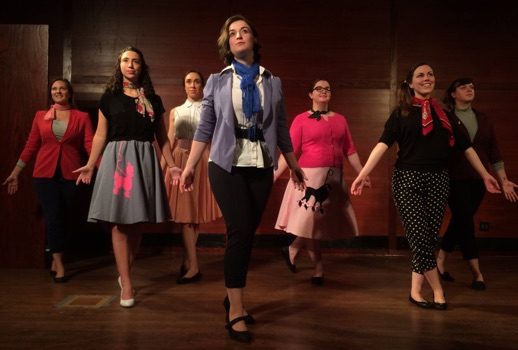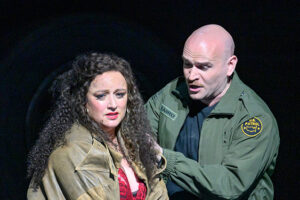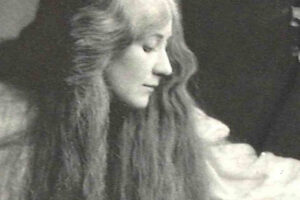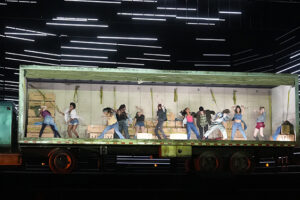

“Ladies, this is where we turn and sell it with a look!”
“It’s an unjust world, and virtue is triumphant only in theatrical performances.”* One injustice is the oblivion to which whole genres of once-popular theater pieces have been consigned. Have them out! Perform them, by all, by any, means!
Such was my reflection Saturday night at Hunter College’s Lang Recital Hall, when attending Utopia Opera’s first performance (of four, through next Sunday) of von Flotow’s Martha, a work of 1847 that was popular around the world for a hundred years. The tuneful score was much loved back then, and it did not hurt that there were singers like Sembrich and Patti, Caruso and Gigli, who loved to sing it.
All of them sang it at the Met, though, curiously, half the Met’s more than one hundred performances of Martha took place on tour, as if New York was too sophisticated for old-fashioned claptrap but the folks on the road still cared about it.
When an opera has been loved for so long, in my experience, it falls from the repertory not because of any slightness of quality but because the popular taste has dramatically changed, as it so often does. Given by able singers with a proper sense of style, works such as Martha or Der Vampyr or Mignon or Die Lüstigen Weiber von Windsor still delight.
The current Utopia production of Martha, perhaps New York’s first since the City Opera gave it in 1990, is performed by a small, scrappy orchestra (they warm up after the overture) and a chorus light on male voices but capable of snappy footwork. It is performed in the original German, with English subtitles. That’s a good choice: there are several English translations, all execrable.
William Remmers conducted and directed. He updated the piece from the reign of Queen Anne to that of youthful Elizabeth II (which seems like ages ago), probably to save money on costumes. Scenery is minimal. The cast’s moves are Broadway-inflected, and Remmers has the skill to get them to toss a leg or cock a snook with winning precision.
The singers vary between surprisingly good and not so surprising. Flotow’s style of melody, familiar from Weber and Schumann, still gives pleasure. But, after Utopia’s exceptional Ballad of Baby Doe last spring (a much more elaborate piece, too), Martha’s opening night was a bit of a letdown.
Let us start with Lady Harriet, because she is the title character of Martha and, well, if she charms us, the opera is a hit, and if she fails to do so, even if she can sing, it will just be a collection of tunes. Companies usually give this opera if a soprano of overpowering charm would like to sing it. (At the Met’s last new production, Victoria de los Angeles—get the idea?) Utopia is doing it because fans voted for it on the Utopia web site, and this is a defective method of choosing. First, you should get a Martha; then, you tell the audience they have (democratically) chosen it. That’s the way.
Elizabeth Treat has a pretty but unremarkable voice, thin but sweet and well trained—the trill is attractive, the leaps about the scale in her final aria impressive. But she does not bring her ladyship to life. Ennui is not an attractive quality in any case, and Lady Harriet’s decision to escape boredom by pretending to be a housemaid leads Lionel to heartbreak—so we aren’t inclined to like her.
Harriet/Martha has to persuade us of her gentle, awakening heart. Miss Treat was a blank wall, staring into space, perhaps opening night jitters. “The Last Rose of Summer” should make us feel the sadness solitude. Treat warbled a sweet line and Remmers accompanied it gently, but it did not evoke tears.
Louis Riva had the charm for Lionel, the sentimental farmer who falls for the disguised lady and proclaims it in the most famous of Flotow’s tunes, “Ach, so fromm.” (“M’appari,” for Caruso fans, but Riva sang in German.) Riva has an attractive tone; too, he sings and acts with ardent resolve. But his voice is light, even for this role, and would be lost in a full-sized theater. Too, though I understand the director’s wish to avoid the cliché of having singers stand still to deliver an aria as if at an audition, sitting on a box and then rising at the stretta looks just as artificial.
The singers of the secondary, comic roles, Nancy and Plunkett, were far more appealing, and their romance was more exciting, too. (Nowadays, we prefer to identify with earthy, humorous lovers rather than the pallid, poetic romantic icons of the romantic era.) Plunkett, the solid yeoman farmer, was Nick Miller, likeably beefy even when knitting, whose flexible baritone had an enjoyable solidity.
But the voice and personality that stood out most belonged to Caroline Tye, a true contralto, in the role of Nancy/Julia, with the sort of cool stare that communicates everything she is thinking and a sharp aside as well. Think of Bea Arthur or Nancy Walker, also excellent gravel-voiced singers. Tye was always worth watching whatever nonsense the plot obliged her to concoct, and always worth hearing even when it was only a predictable harmony.
Remmers, in his director’s hat, spiced up the Nancy-Plunkett duet—they don’t strip, mind you; they begin to strip each other—while the voices unaffectedly continued. I’m not sure if Tye’s voice is big enough for a career, but she’s so winning a performer that I look forward to her further efforts. (A Phoebe Merrill, maybe—or Tessa.)
The comic role of Lady Harriet’s amorous cousin, Sir Tristan, was performed by Roman Laba, who has a pleasant dark voice and enjoys playing ridiculous. But one can be heterosexual and ridiculous, you know; Laba did not quite play that. Anyway, he knows how to twirl an umbrella. The chorus sounded like more singers than they were and a more gender balanced group than they were. Good. And everyone present seemed surprised what a pleasure the score was, and how pleasant to hear it performed unselfconsciously. But why should we be? It was a hit for a hundred years, you know.
* The Mikado, consoling his cast for their upcoming execution.






















Comments